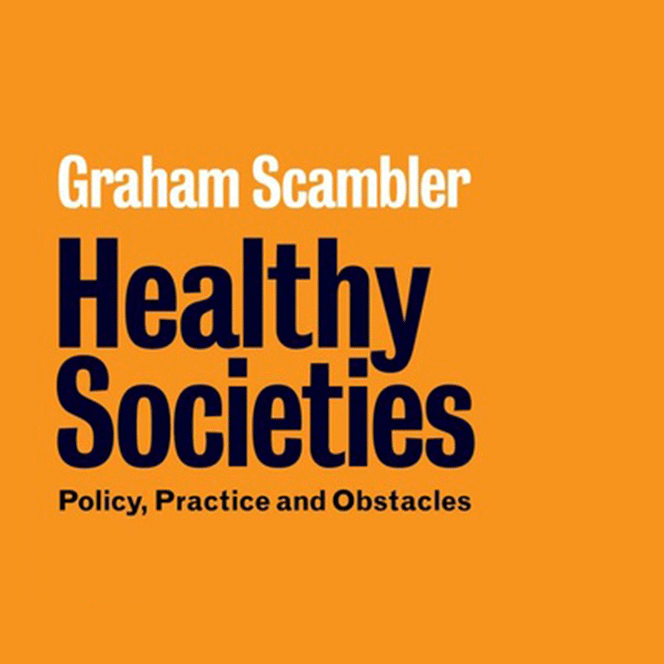When I wrote ‘Healthy Societies: Policy, Practice and Obstacles’ (Policy Press 2024) for the British Sociological Association’s ‘21st Century Standpoints’ series, I had three main goals in mind. The first was to take seriously the notion that deep and enduring social structures are the fundamental causal mechanisms responsible for health inequalities in Britian and elsewhere. The second was to substantiate and face up to the uncomfortable fact that these same structures represent formidable obstacles to the raft of policies being promoted to address or ‘tackle’ what in the wake of the political austerity post-2010 and the COVID-19m pandemic are ever-worsening health inequalities. And the third was to argue for a concept of the ‘healthy society’ that escapes the confines of a nation state like Britain to insist that any reduction of national health inequalities must not be at the price of exporting hardship, suffering and distress elsewhere. We now inhabit a world replete with risk.
I have been arguing for many years that it is not enough for sociologists researching and writing about health inequalities to merely include a token statement on the importance of social structures in their concluding paragraphs. So often ‘real’ structural relations of class go missing when class is defined using proxies like NS-SEC, used because they are expedient for multivariate analysis. In my book I make a case that the existence and potency of ‘real’ relations of class for health inequalities are indisputable, and that without structural change programmes for reducing health inequalities will continue to disappoint. But how to accomplish social structural change?
The formula I draw on is: capital buys power to make policy in its interests (adding that it realises a greater return on its investment in post-1970s rentier or asset management capitalism than it did in postwar welfare state capitalism). I focus especially on those I call ‘capital monopolists’, the less than 1% of the adult population comprising major shareholders, financiers and CEOs with a global reach and no national loyalties to speak of. It is their clandestine strategic decisions, I attempt to show, that impact decisively on state social and health policy in Britain and lead directly and/or indirectly to the production and reproduction of health inequalities. This is captured in what I call a ‘class/command dynamic’.
To confront head-on the problem of securing the transformational structural change that is a necessary if not sufficient condition for substantially reducing health inequalities I turn to sociological theory. I offer a class-based neo-Marxist perspective using the work of Erik Ohlin Wright, topped up with Habermas, Bhaskar, Archer and others. My thesis amounts to plotting a possible route to what Ben Adams calls ‘spontaneous mass mobilisation’. I accept that this will sooner rather than later require working-class engagement and leadership, which in the present remains a tough ask given the present predilection for cultural relativisation, identitarian politics and a ubiquitous neoliberal ideology. But I contend that there already exists a deep well of public anger, even hatred, directed at Britain’s political elite and the ‘system’ it represents and protects, and that this has seeped into parts of the increasingly ‘squeezed’ middle class. Anger and hatred can be spurs to collective action. The blue touch paper could be lit by an unpredictable trigger event bringing people onto the streets. A possible context allowing the flames to grow and spread might involve what Habermas called a ‘legitimation crisis’. This occurs when the state can no longer reconcile the enhanced role it has played since WW2 in managing the economy with retaining the trust and confidence of the electorate. Even the super-rich are asking how much wealth and income (and health) inequality people will tolerate before a rebellion is triggered. I also analyse the salience of civil disobedience and oppressive state symbolic (soft) and coercive (physical) violence and rebels’ reactions to it. And I contrast utopian realist narratives constructed, refashioned or taken over by grassroots working-class activists and utopian blueprints designed by professional middle-class activists, stressing the role of the first. This is all done with full awareness of sociologists’ (understandably) poor record of predicting futures and the risks that inevitably attend spontaneous mass mobilisations oriented to lasting structural change. But let’s acknowledge and face up to what tackling health inequalities actually involves.
As I indicated at the start, an important part of my project in ‘Healthy Societies’ was to query the conventional agendas for both population health sociologists and public health practitioners. A society like Britain – in the Global North – cannot be seen and defined as ‘healthy’, I argue, if it reduces ‘its own’ material, social and health inequalities by upping its domination and exploitation of other societies – in the Global South. I push this point home by including chapters on climate change and warfare, in the process documenting the iniquitous role British and other nations clustered in the Global North have played historically and continue to play. We cannot accept a domestic public health policy that sidelines or neglects how ‘our’ capital monopolists, and what has been aptly named their ‘concierge class’ of professional and managerial allies, are displacing disaster elsewhere. Britain continues to invest in oil and gas and to sell arms to all comers, while clamping down, and recently charging and imprisoning, activists who campaign for a safer and more secure future for all. Sociologists as a community, I argue, must resist managerial attempts to constrain it/us by the strategic or instrumental use of metrics. We should append Burawoy’s four sociologies by adding what I call a ‘foresight sociology’ oriented to different and better ways of organising society’s institutions, and an ‘action sociology’ oriented to contesting political and ideological attempts to rubbish sociological research that exposes class-based domination and exploitation.
Graham Scambler is Emeritus Professor of Sociology at UCL and a Fellow of the Academy of Social Sciences, UK. He has published many books, chapters and journal articles on social theory, health and sport. His latest book is ‘Healthy Societies’, Policy Press, 2024.


